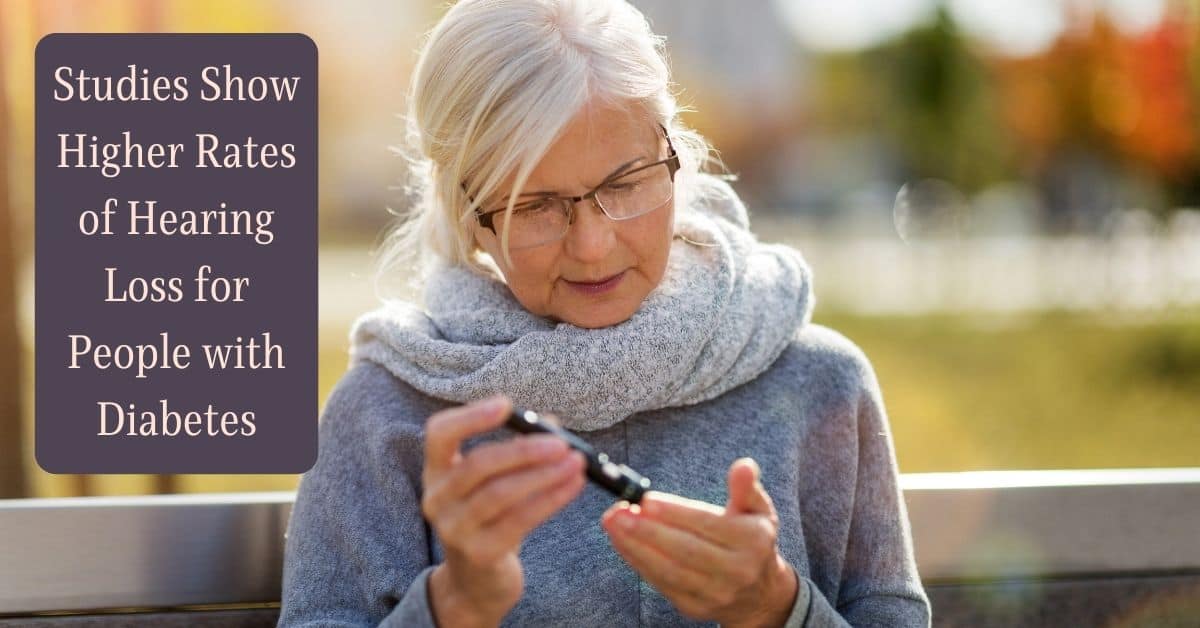
Are you worried that your hearing isn’t as good as it once was? There are a number of causes of hearing loss, including exposure to noise, and even the natural aging process. Hearing loss is also linked to a number of health concerns. Heart disease, high blood pressure, an infection, or even an injury can all lead to hearing loss. One new study shows higher rates of hearing loss for people with diabetes.
What is Diabetes?
According to the CDC, there are 34.2 million Americans with diabetes, and another 88 million American adults who have prediabetes. This means you probably know someone who has diabetes or is at risk of developing diabetes very soon. Diabetes is a health condition where the body doesn’t make enough insulin, or doesn’t use insulin effectively. You need insulin to transport the nutrients from your bloodstream into the cells in the body. Without insulin, you’ll have high blood sugar levels, and those nutrients never make it into your cells.
- Prediabetes: this is a common condition among American adults. Prediabetes means that you have high blood sugar levels, and you have a high risk of developing Type 2 diabetes. With changes in lifestyle, you can prevent the development of Type 2 diabetes.
- Type 2 diabetes: This is the most common kind of diabetes. Your body doesn’t use insulin effectively, so your body can’t keep blood sugar levels under control.
- Type 1 diabetes: This type of diabetes is most common among children or teens. People with Type 1 diabetes don’t produce enough insulin, so blood glucose levels are dangerously high.
Diabetes and Hearing Loss
A recent study showed that people with diabetes are almost twice as likely to have a hearing loss as people without diabetes! One reason is that the high blood sugar that goes along with diabetes can damage nerves and blood vessels throughout the body, including in the ears. People who have had diabetes for a long time may have extensive damage to the cells in the ear.
Diabetes is also linked to poor blood circulation. When the heart isn’t pumping oxygenated blood throughout the body, not all the cells in the body are getting enough oxygen and nutrients. The extremities, such as the ears, can be oxygen deprived. The delicate cells in the ear are very susceptible to changes in blood flow, so diabetes can lead to an increased risk of hearing loss.
Reducing Your Risk of Diabetes
Doctors have a few recommendations when it comes to reducing your risk of diabetes or managing your symptoms of diabetes. It’s important to eat healthy foods, lots of vegetables and fruits, and to limit your intake of processed sugar. Another way to reduce your risk of diabetes is to limit your alcohol intake and quit smoking.
Make sure you do a few minutes of moderate exercise every day to improve circulation and strengthen your heart. When you have good circulation and blood is pumping throughout your body, you’ll be keeping your whole body, as well as your ears, healthy and strong.
How to Protect Your Hearing
If you have diabetes and you’re worried about your hearing health, there are a few ways you can protect your hearing:
- Get regular hearing tests every 1 to 2 years to find out if your hearing has changed
- Catch hearing loss early, and treat your hearing loss as soon as possible
- Turn down the volume on your personal listening device, and never turn it up past 60%
- Wear earplugs whenever you’re in places with a lot of background noise, like at a concert, sports game, or on a noisy jobsite
These are just some of the ways you can protect your hearing and prevent hearing loss.
Treating Hearing Loss
Do you have hearing loss? Whether you have hearing loss due to diabetes or some other factor, the best thing you can do for your overall health is to treat your hearing loss as soon as possible.
We have a range of hearing aids to suit your hearing needs. We also have hearing aids designed for every lifestyle and budget. Hearing aids will help you hear speech, and ignore distracting background noise. They’ll also help you follow conversations and enjoy every moment of your life with great hearing.
Contact us today to schedule a consultation!
